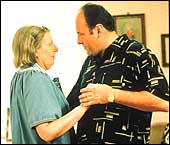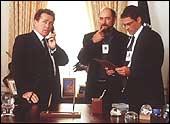|
|

|
|
 Nancy Marchand and James Gandolfini in "The Sopranos."
Nancy Marchand and James Gandolfini in "The Sopranos."
Best Television 1999
By Matthew Gilbert
1. "The Sopranos"
2. "Will & Grace"
3. "The West Wing"
4. "Sex and the City"
5. "The Practice"
6. "Once and Again"
7. "Action"
8. "Freaks and Geeks"
9. "The E! True Hollywood Story"
10. "Shooting the Past"
|
 t the end of the century, amid all the mediocrity and tin laughter, TV hiccuped and out came a few truly superior pieces of entertainment. The sitcom circa 1999 showed only small signs of life, but the hourlong drama took a few strong strides forward. Evidence No. 1: ''The Sopranos,'' of course. Those remote-holders willful enough to leap to cable during prime time were rewarded with creator David Chase's brilliant family series, the most unexpected TV success since ''Twin Peaks'' caught on (not that the two have much in common).
t the end of the century, amid all the mediocrity and tin laughter, TV hiccuped and out came a few truly superior pieces of entertainment. The sitcom circa 1999 showed only small signs of life, but the hourlong drama took a few strong strides forward. Evidence No. 1: ''The Sopranos,'' of course. Those remote-holders willful enough to leap to cable during prime time were rewarded with creator David Chase's brilliant family series, the most unexpected TV success since ''Twin Peaks'' caught on (not that the two have much in common).
Many of us were skeptical in January when HBO introduced the series, yet another take on the mob. The subject has been done to death, after all, and done by masters like Martin Scorsese and Francis Ford Coppola. But while Chase borrowed from Scorsese, his ''Sopranos'' was like nothing before it. It merged the dysfunctional-family obsession of the 1990s with made men whose world had drifted so far from its glory days - the honor-code era of ''The Godfather'' - that their despair was sympathetic. Yes, they were killers and thieves, but the series gave them so much dimension you couldn't help but temper your judgment, or at least compartmentalize it as intensely as they do. An adulterer and a cold-blooded murderer, Tony Soprano was still a big kid taking the nurturing from his therapist that he'd never gotten from his mother.
The cast and their characters were unforgettable, notably Nancy Marchand as the murderous matriarch and Edie Falco as Tony's fiery wife, but the show's anchor was James Gandolfini. Quite simply, he made Tony impossible to hate. Visually, Gandolfini flickers between a threatening hothead and a puppy dog, with murderously heavy eyelids one moment and then a Fred Flintstone body and a chunky smile the next. And emotionally, and morally, he's just as shifty. Each episode was rich, but the one in which he whacks a mob rat while escorting daughter Meadow on a college tour captured the series' ability to push us beyond easy judgment.
Why did I put ''Will & Grace'' at No. 2? Partly because, as TV comedy struggles in the wake of ''Seinfeld,'' it's the only newish sitcom that works - and I mean works in both senses of the word. It works hard to make every line, every raised eyebrow, and every pop-cultural reference count. And it works, in that the show feels consistently honest, funny, and clever, insomuch as a sitcom can be any of those. It has created four memorable characters, two of whom, Sean Hayes's Jack and Megan Mullally's Karen, are already worthy of TV's supporting-player Hall of Fame. They are unique creatures who bask in their own fabulousness as much as we do. And Will and Grace themselves get more interesting, and synchronous, as the show continues.
But mostly I honor ''Will & Grace'' for doing exactly what a sitcom can do at its most powerful and most subversive: Use laughter to open minds, to upend dated thinking, to turn overanalyzed issues into jokes. The show is the gayest series ever to hit the networks, and it's somewhat sophisticated in its observations about gay life; and yet it is as mainstream as mainstream gets in this splintered time. It takes both insiders and outsiders and throws them together for half an hour of TV yuks. Best of all, it never loses sight of its role as a sitcom, never turns into a preachy treatise. Maybe that's why, in its second year, it remains free of anti-gay controversy, leaving Jerry Falwell and like-minded folks to ponder the troubling triangularity of TV's Teletubbies.
 Martin Sheen, Richard Schiff, and Rob Lowe in "The West Wing."
Martin Sheen, Richard Schiff, and Rob Lowe in "The West Wing."
|
''The West Wing'' is gradually turning into the fall season's best new show. Like ''Sports Night,'' the other series from creator Aaron Sorkin, it flirts dangerously with sentimentality and easy liberal thinking as it portrays the workings of the presidential office. But at its best it also boasts some of the smartest script-writing this side of ''The Sopranos,'' with wonderfully tense interoffice confrontations and juicy philosophical quandaries. The characters are beautifully performed, particularly John Spencer's chief of staff and Allison Janney's press secretary, and the camerawork is as sophisticated as that in most movies. If Sorkin can resist the impulse to manipulate audiences, ''The West Wing'' could become a keeper.
''Sex and the City,'' another HBO series, had a spectacular second season. This explicit comedy about single life in Manhattan is written out of the gritty wisdom and black humor that comes from experience. Yes, the show's four central women are unable to think about anything but finding the right man; but along the way they are learning about love, self-protection, and the power of their friendship with one another. For many folks, that's the way the world of urban romance works, like it or not. The resolution of Carrie's relationship with Mr. Big was witty, subtle, and touching, as it sampled ''The Way We Were,'' but best of all it revealed a character who had grown as a result of her pain. As Carrie, Sarah Jessica Parker was comic and moving, and her three supporting actresses were equally appealing. You won't find such rich roles for women on most of network TV.
Last year, I put ''The Practice'' at the top of my list, noting its addictive storytelling and strong ensemble. But while it finished its third season in triumph in May, and picked up a few Emmys including best drama, it has been annoyingly uneven since it returned in September. Lately, for every tart bit of dialogue, there have been painfully unbelievable storylines, glaring character inconsistencies, and frivolous office spats that clash with the show's tone. The worst offense was when the ongoing George Vogelman plot, which brought us the haunting and campy image of the murderer in a nun's outfit, was thrown away with a quickie resolution that was as thrill-free as a careless B movie. Other offenses included an inane wedding-dress debate and the decision to diminish the presence of Camryn Manheim. Still, half a year of topnotch ''Practice'' is better than a full year of most shows.
Despite its emotional excesses, the post-divorce melodrama ''Once and Again'' is one of the most honest shows on TV. For proof, just compare Sela Ward's tense scenes with her children to the Hallmark moments between fellow single TV mother Amy Brenneman and her daughter on ''Judging Amy.'' Eventually, ''Once and Again'' may need to reach beyond the strains of a second-time-around relationship, and some humorous moments wouldn't hurt. But for now, the show is adult angst at its most engaging.
''Action,'' oh ''Action.'' I grieve this ambitious comedy, which Fox mishandled by slotting it against NBC's Thursday Must-See lineup. Ultimately, though, ''Action'' was probably canceled because it was too venomous for prime-time America. It was a vulgar half-hour, after all, with hookers, pimps, actors, and producers in all kinds of compromising positions. But then it was a portrait of a vulgar world: Hollywood. As the amoral action producer Peter Dragon, Jay Mohr was perfect - too perfect, perhaps, since most TV viewers like a hero with at least one redeeming quality. The post-''Hill Street Blues'' era has proven our ability to accept flawed characters, but, apparently, not this flawed. During its short life, the laugh-track-free ''Action'' didn't talk down to viewers as it traded in a genre that network TV hasn't fully explored: satire. Let's hope the series was ahead of its time.
''Freaks and Geeks'' deserves a Top10 slot for its casting alone, with its authentic collection of awkward adolescents. But the magic of this warm high school dramedy, which is set in the early 1980s, is that it restores bare innocence to the teenage years at a time when that innocence is obscured by facile hipness and media savvy (''Dawson's Creek''). ''Freaks and Geeks'' dissects the classically painful moments among teenagers, from the fear of competitive sports to the need for a clique. As Lindsay Weir, a former ''mathlete'' nerd trying to express her individuality with a clique of freaks, Linda Cardellini is an unassuming star. She makes courage look as hard as it is worthwhile.
My cheap thrill was ''The E! True Hollywood Story,'' which sucks me in whenever I stumble across it. It veers dangerously into tabloid-fabrication territory, but ultimately it's just a cheesy dish that makes A&E's ''Biography'' look like homework. My classy thrill was a two-part installment of ''Masterpiece Theatre'' called ''Shooting the Past,'' which paid homage to the magic of old-fashioned black-and-white photography, as well as the necessity of eccentricity in the human character. And my honorable mentions include the witty horror of ''Buffy the Vampire Slayer,'' the playful ensemble of ''Friends,'' the endless pop countdowns of ''The List,'' and the classy college distress of ''Felicity.''


